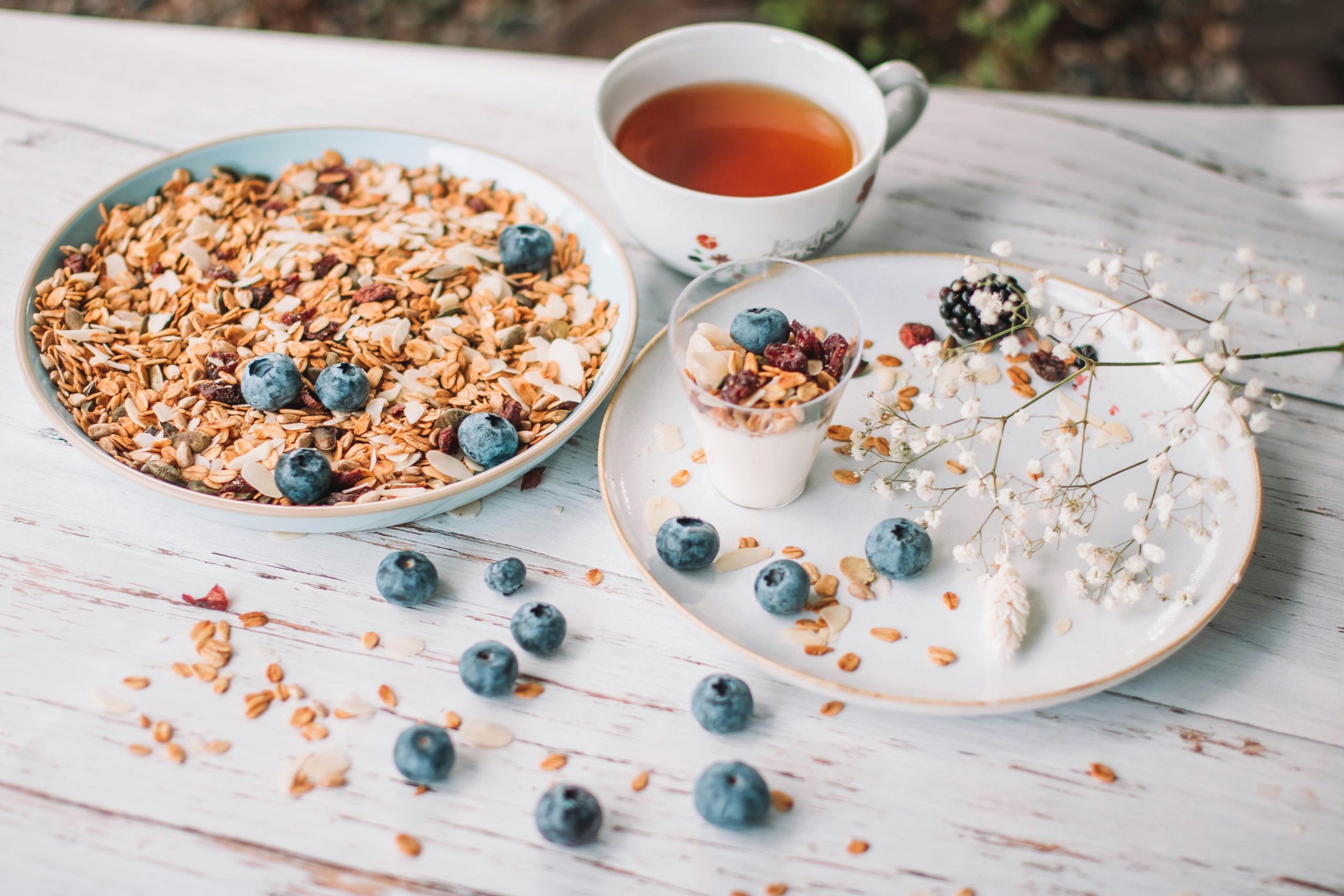Sip Your Way to Wellness with Blueberry Tea
Introduction
Have you noticed the rising buzz around blueberry tea lately? It’s not just another tea trend. Health enthusiasts, wellness seekers, and tea lovers are all raving about this delicious brew for a good reason. Whether you’re looking to boost your health or simply enjoy a flavourful tea, blueberry tea offers a perfect blend of taste and wellness benefits. This blog post dives deep into why blueberry tea deserves a spot in your pantry and how it can contribute to a healthier lifestyle.
The Health Benefits of Blueberry Tea
Antioxidant Powerhouse
Blueberry tea is packed with antioxidants, which are compounds that help combat oxidative stress and protect your cells from damage. Blueberries, the star ingredient, are rich in anthocyanins—a type of flavonoid with potent antioxidant effects. These antioxidants can help reduce inflammation, lower the risk of chronic diseases, and even slow the aging process. Imagine sipping a cup of tea that not only tastes amazing but also helps keep you youthful and vibrant!
Cognitive Function Booster
Did you know that blueberry tea can be a brain booster? Studies have shown that the antioxidants in blueberries can improve cognitive function and delay age-related cognitive decline. Drinking blueberry tea regularly may enhance memory, focus, and overall brain health. This makes it an excellent choice for students, professionals, and anyone looking to keep their mind sharp.
Support for Heart Health
Heart health is a major concern for many, and blueberry tea can be a fantastic ally. The antioxidants in blueberries can help lower blood pressure, reduce bad cholesterol levels, and improve arterial function. These benefits contribute to a healthier heart and lower the risk of cardiovascular diseases. Adding blueberry tea to your daily routine can be a tasty and simple way to show your heart some love.
Nutritional Content and How it Compares to Other Teas
Rich in Vitamins and Minerals
Blueberry tea is not just about antioxidants; it also boasts an impressive nutritional profile. It’s a great source of vitamins C and K, as well as manganese and dietary fiber. These nutrients play vital roles in maintaining your immune system, bone health, and digestive function. Compared to other teas, blueberry tea stands out for its unique combination of vitamins and minerals.
Low in Calories
For those mindful of their calorie intake, blueberry tea is a winner. It’s naturally low in calories, making it an excellent choice for weight management. Unlike sugary beverages or high-calorie snacks, a cup of blueberry tea satisfies your taste buds without adding extra pounds. This makes it a guilt-free indulgence you can enjoy any time of the day.
No Caffeine Jitters
If you’re sensitive to caffeine or looking to cut back, blueberry tea is a fantastic alternative. Unlike black or green tea, blueberry tea is naturally caffeine-free, allowing you to enjoy its benefits without the jitters. This makes it an ideal option for evening relaxation or for those who prefer a caffeine-free lifestyle.
Blueberry Tea Recipes
Classic Hot Blueberry Tea
Making a hot cup of blueberry tea at home is simple and rewarding. Start with a high-quality blueberry tea blend or dried blueberries. Steep one teaspoon of tea or a handful of dried blueberries in boiling water for 5-7 minutes. Strain and enjoy the warm, soothing flavours. You can add a touch of honey or lemon to enhance the taste.
Refreshing Iced Blueberry Tea
For a refreshing twist, try making iced blueberry tea. Brew a strong batch of blueberry tea by steeping a few extra teaspoons of tea leaves or dried blueberries in boiling water. Allow the tea to cool completely, then pour over ice. Garnish with fresh mint leaves and a few whole blueberries for an extra burst of flavor and visual appeal.
Blueberry Tea Smoothie
Take your blueberry tea to the next level with a delicious smoothie. Brew a cup of blueberry tea and allow it to cool. In a blender, combine the tea with a handful of fresh or frozen blueberries, a banana, a spoonful of Greek yogurt, and a drizzle of honey. Blend until smooth and enjoy a nutrient-packed, refreshing drink that’s perfect for breakfast or a midday snack.
Where to Find Quality Blueberry Tea
Local Health Food Stores
Your local health food store is a great place to start your search for high-quality blueberry tea. Look for organic options to ensure you’re getting the best possible product. Many health food stores carry a variety of brands, so you can find the one that best suits your taste and quality preferences.
Online Retailers
If you prefer the convenience of online shopping, numerous retailers offer a wide selection of blueberry tea. Websites like Amazon, iHerb, and specialty tea shops provide detailed descriptions and customer reviews to help you make an informed decision. Look for products with high ratings and positive feedback to ensure you’re getting a top-notch tea.
Farmers’ Markets
For a more personalized shopping experience, visit your local farmers’ market. Many vendors offer artisanal and small-batch blueberry tea blends that you won’t find in stores. Plus, you can often sample the tea before you buy, ensuring you love the flavour and quality.
Testimonials and Reviews
Real-Life Experiences
Hearing from others who have incorporated blueberry tea into their daily routine can be incredibly motivating. Jane, a health enthusiast from California, shares, “I’ve been drinking blueberry tea for six months now, and I’ve noticed a significant improvement in my energy levels and overall well-being. It’s become a staple in my morning routine.”
Authenticity and Relatability
Mark, a fitness coach from New York, adds, “I recommend blueberry tea to all my clients. It’s a great way to stay hydrated and get a dose of antioxidants without the added calories. Plus, it tastes amazing!”
Community Insights
Sarah, a member of an online tea community, says, “Joining the blueberry tea trend has been one of the best decisions for my health. The support and tips from the community have made the transition easy and enjoyable. I look forward to my daily cup of blueberry tea and the benefits it brings.”
Conclusion
Blueberry tea is more than just a flavourful beverage; it’s a powerhouse of health benefits waiting to be discovered. From its antioxidant properties and cognitive function support to its heart health benefits, blueberry tea offers a multitude of reasons to make it a part of your wellness routine. With easy-to-follow recipes, tips on sourcing high-quality tea, and testimonials from real users, there’s no reason not to give blueberry tea a try.
Join the growing community of blueberry tea enthusiasts and start reaping the benefits today. Share your experiences or ask questions in the comments below—we’d love to hear from you!
Looking for more ways to enhance your health and wellness? Check out our other articles and stay tuned for more tips and insights to help you live your best life.
FAQ
1. What are Top 3 Benefits of Blueberries
Blueberries are packed with essential nutrients that offer a range of benefits. First, they are high in antioxidants, which help fight free radicals and reduce oxidative stress, supporting overall health. Second, they are great for heart health, helping to reduce blood pressure and improve cholesterol levels. Finally, blueberries are known for boosting brain health, aiding in memory and cognitive function. Incorporating a handful into your daily diet is a delicious way to support both mind and body.
2. Can I Drink Blueberry Tea at Night?
Yes, you can absolutely enjoy blueberry tea at night. In fact, blueberry tea is naturally caffeine-free, making it a relaxing beverage before bed. Not only is it soothing, but it also contains antioxidants that help your body unwind after a long day. I find that sipping on a warm cup of blueberry tea helps me relax and promotes better sleep, making it the perfect bedtime routine.
3. Is Blueberry Tea Good for the Kidneys?
Blueberry tea may support kidney health due to its rich antioxidant content. Blueberries are known to reduce inflammation and oxidative stress, both of which are beneficial for kidney function. I’ve found that incorporating blueberry tea into my diet gives me peace of mind knowing I’m helping to protect my kidneys while also enjoying a tasty, natural beverage.
4. What Is Blueberry Drink Good For?
A blueberry drink, whether it’s tea or juice, is fantastic for overall well-being. It supports heart health by reducing cholesterol and blood pressure, boosts the immune system with its high vitamin C content, and aids in digestion due to its fiber content. Personally, I love starting my day with a blueberry drink to feel refreshed and energized.
5. What Is the Purpose of Blueberry Tea?
The purpose of blueberry tea goes beyond just taste—it’s a powerhouse of health benefits. Rich in antioxidants, it helps protect the body from oxidative stress and inflammation. Drinking blueberry tea regularly can support heart health, enhance digestion, and even promote skin health. For me, it’s not just a delicious tea but a daily wellness habit.
6. Is Blueberry Tea Good for the Liver?
Yes, blueberry tea is considered good for liver health. Blueberries contain antioxidants like anthocyanins, which help detoxify and reduce inflammation in the liver. I’ve read that including antioxidant-rich foods like blueberries can potentially reduce fatty liver and promote healthy liver function, which is why I often choose blueberry tea as my go-to detox drink.
7. Who Should Not Take Blueberries?
While blueberries are generally safe for most people, individuals with certain conditions should be cautious. If you’re allergic to berries or taking blood thinners like warfarin, you should consult your doctor before consuming large amounts of blueberries. I always suggest checking with a healthcare professional if you have specific concerns, just to be on the safe side.
8. Are Blueberries High in Sugar?
Blueberries do contain sugar, but they are considered a low-glycemic fruit, meaning they won’t spike your blood sugar levels. With about 15 grams of sugar per cup, they provide a natural sweetness without the crash. I find that blueberries satisfy my sweet tooth while still being a healthy choice compared to sugary snacks.
9. Is Blueberry a Detox?
Yes, blueberries are often regarded as a natural detoxifier. Their high antioxidant content helps flush out toxins from the body and supports liver function. I love incorporating blueberries into smoothies for a refreshing detox that also provides a burst of nutrients.
10. Which Tea Cleans the Liver?
There are several teas known for supporting liver detoxification, but milk thistle and dandelion tea stand out as top choices. These teas are praised for their ability to cleanse the liver and promote healthy function. Whenever I feel the need for a detox, I turn to these herbal teas for a gentle yet effective cleanse.
11. Do Blueberries Reduce Fatty Liver?
Yes, studies suggest that blueberries can help reduce fatty liver due to their high levels of antioxidants, particularly anthocyanins. These compounds reduce oxidative stress and inflammation, both of which contribute to liver health. Personally, I feel more confident in my liver health knowing that a handful of blueberries can make a difference.
12. Is Blueberry Tea Good for Cholesterol?
Yes, blueberry tea can be beneficial for cholesterol levels. The antioxidants in blueberries help to lower bad LDL cholesterol and raise good HDL cholesterol, promoting heart health. I enjoy drinking blueberry tea regularly, knowing it’s not only refreshing but also good for my cholesterol.
13. Is Blueberry Tea Good for Blood Sugar?
Blueberry tea is a great option for those looking to manage their blood sugar levels. Blueberries have a low glycaemic index, which means they don’t cause rapid spikes in blood sugar. Incorporating blueberry tea into your routine can help stabilize glucose levels. For me, it’s a delicious way to support blood sugar control while enjoying a fruity beverage.
14. How Much Blueberry Per Day?
Eating about one cup of blueberries a day is recommended to reap their health benefits. This amount provides a good balance of vitamins, antioxidants, and fiber. Personally, I try to stick to this daily serving, whether it’s in my morning oatmeal, smoothies, or as a snack.
15. Are Blueberries Good for Weight Loss?
Yes, blueberries can support weight loss due to their low-calorie, high-fiber content. They keep you feeling full for longer, reducing the likelihood of overeating. I find that incorporating blueberries into my diet helps curb cravings without adding too many calories, making them a perfect snack for weight management.
16. What Are 5 Health Benefits of Blueberries?
- Rich in antioxidants, protecting against aging and disease.
- Supports heart health by lowering blood pressure and cholesterol.
- Boosts brain function and memory.
- Aids digestion with its high fiber content.
- Promotes healthy skin, reducing wrinkles and damage.
In my experience, these benefits make blueberries a must-have in my daily diet for overall wellness.
17. Are Blueberries Fat Burners?
Blueberries may assist in fat burning, especially belly fat, thanks to their polyphenol content. These compounds help break down fat and prevent new fat cells from forming. I’ve found that incorporating blueberries into my diet alongside exercise gives my metabolism a boost.
18. Do Blueberries Help You Sleep?
Yes, blueberries contain nutrients like magnesium and antioxidants that promote relaxation and better sleep. I often snack on blueberries in the evening or have a cup of blueberry tea before bed to improve my sleep quality.
19. Which Fruit Is Best to Eat at Night?
Fruits like kiwis, bananas, and cherries are great to eat at night due to their natural ability to promote sleep. They contain melatonin or serotonin, which help regulate sleep cycles. I often opt for cherries if I’m looking for a sweet, sleep-inducing snack before bed.
20. What’s the Best Time to Eat Blueberries?
The best time to eat blueberries is in the morning or as part of your breakfast. They give you a burst of energy and help with digestion throughout the day. Personally, I enjoy adding them to my morning smoothie or oatmeal for a nutrient-rich start to my day.






